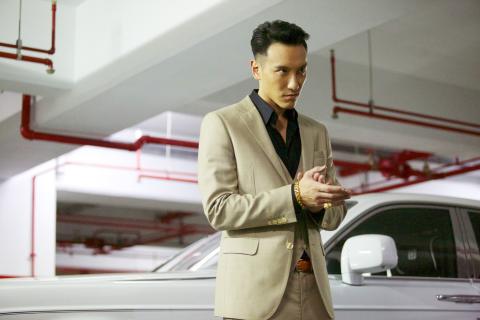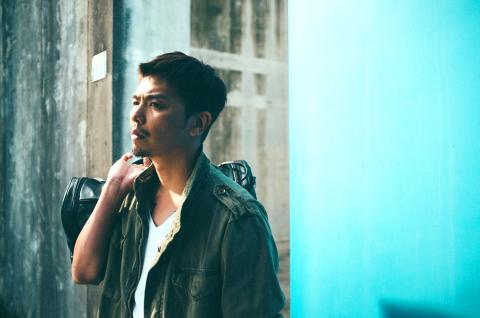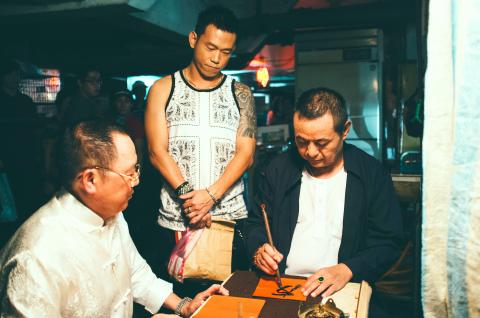Joe Lee (李運傑) packs plenty into his latest film, Gatao, a gangster drama that features plenty of bloodshed, turf wars, romance and familial bonding.
Unfortunately none of these tropes click.
Despite superior production values and a handsome cast led by Alien Huang (黃鴻升) and Sunny Wang (王陽明), the film fails to depict the fascinating world of gatao — Taiwan’s criminal world — and instead devolves into soap-opera frippery filled with narrative loopholes and false emotions.

Photo courtesy of Winday
In the beginning of Gatao, gang life involves street fights with sticks and knives, but everyone is under the control of Boss Yong (Tsai Chen-nan, 蔡振南). To Xiong (Huang), who is arrested during a turf battle, serving time for the gang is proof of brotherhood. Upon his release from prison, Xiong is immediately promoted by Boss Yong to oversee a traditional market where he grew up.
At first, life at the market is good. Xiong knows everyone and takes up the responsibility to look after the shopkeepers. He also strikes up a romance with childhood friend Lei Lei (Christina Mok, 莫允雯). Meanwhile, Xiong’s popularity grows, becoming a threat to Yong’s right-hand man Qing Feng (Sun Peng, 孫鵬),who has a crush on Lei Lei, and believes he is next in line to head the gang.
Things quickly deteriorate when Michael (Wang), the US-educated son of the late rival-gang leader, returns to claim his throne. Depicted as crude and money-driven, the entrepreneurial Michael sees himself as a property developer and has set his mind on what he views as a profitable urban renewal project. But Michael’s plan involves tearing down the market.

Photo courtesy of Winday
Conflicts and bloodletting soon ensue. Torn between his responsibility to the gang and his love for the grandmother who raised him and Lei Lei, Xiong now must make difficult choices that eventually lead to betrayal and murder.
The film’s promising examination of traditional values and runaway capitalism largely goes astray. The motives and struggles of the characters are written and performed, but never felt and conveyed. Throughout the over 100-minute long screening time, there is a constant bombardment of melodramatic cliches and genre gimmickry, leading to nothing more than lame mimicry.
One thing worth mentioning is the film’s lush cinematography that graciously captures a familiar side of Taiwanese life, ranging from fluorescent-lit, crowded interiors to the messy, bustling night markets.

Photo courtesy of Winday

Dissident artist Ai Weiwei’s (艾未未) famous return to the People’s Republic of China (PRC) has been overshadowed by the astonishing news of the latest arrests of senior military figures for “corruption,” but it is an interesting piece of news in its own right, though more for what Ai does not understand than for what he does. Ai simply lacks the reflective understanding that the loneliness and isolation he imagines are “European” are simply the joys of life as an expat. That goes both ways: “I love Taiwan!” say many still wet-behind-the-ears expats here, not realizing what they love is being an

Every now and then, even hardcore hikers like to sleep in, leave the heavy gear at home and just enjoy a relaxed half-day stroll in the mountains: no cold, no steep uphills, no pressure to walk a certain distance in a day. In the winter, the mild climate and lower elevations of the forests in Taiwan’s far south offer a number of easy escapes like this. A prime example is the river above Mudan Reservoir (牡丹水庫): with shallow water, gentle current, abundant wildlife and a complete lack of tourists, this walk is accessible to nearly everyone but still feels quite remote.

It’s a bold filmmaking choice to have a countdown clock on the screen for most of your movie. In the best-case scenario for a movie like Mercy, in which a Los Angeles detective has to prove his innocence to an artificial intelligence judge within said time limit, it heightens the tension. Who hasn’t gotten sweaty palms in, say, a Mission: Impossible movie when the bomb is ticking down and Tom Cruise still hasn’t cleared the building? Why not just extend it for the duration? Perhaps in a better movie it might have worked. Sadly in Mercy, it’s an ever-present reminder of just

Google unveiled an artificial intelligence tool Wednesday that its scientists said would help unravel the mysteries of the human genome — and could one day lead to new treatments for diseases. The deep learning model AlphaGenome was hailed by outside researchers as a “breakthrough” that would let scientists study and even simulate the roots of difficult-to-treat genetic diseases. While the first complete map of the human genome in 2003 “gave us the book of life, reading it remained a challenge,” Pushmeet Kohli, vice president of research at Google DeepMind, told journalists. “We have the text,” he said, which is a sequence of